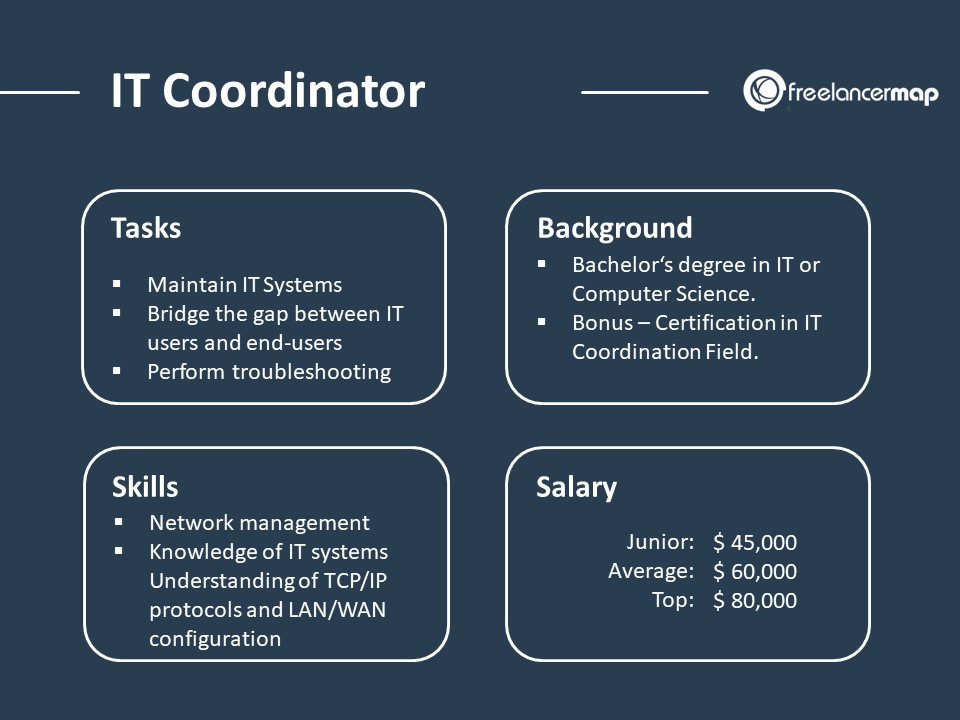Information Technology Coordinator: Bridging Tech and Business
The Information Technology Coordinator acts as a crucial bridge between the technical world of IT and the operational needs of a business. This role requires a unique blend of technical […]

The Information Technology Coordinator acts as a crucial bridge between the technical world of IT and the operational needs of a business. This role requires a unique blend of technical expertise, communication skills, and problem-solving abilities to ensure smooth technology integration and support.
From managing IT infrastructure and troubleshooting technical issues to collaborating with colleagues and clients, the Information Technology Coordinator plays a vital role in keeping organizations connected and efficient. This role demands a proactive approach to identifying and resolving technology challenges, while also staying abreast of emerging trends and industry best practices.
Industry Trends and Best Practices
The field of information technology is constantly evolving, with new technologies and trends emerging at a rapid pace. This dynamic landscape presents both challenges and opportunities for IT professionals, including Information Technology Coordinators. Staying informed about these trends and adapting to them is crucial for success.
Impact of Emerging Technologies on the Role of an IT Coordinator
The rapid evolution of technology has a significant impact on the role of an IT Coordinator. These trends influence the daily tasks, responsibilities, and skill sets required for this position.
- Cloud Computing: Cloud adoption continues to grow, shifting IT infrastructure from on-premises servers to cloud-based services. This trend requires IT Coordinators to be proficient in cloud platforms like AWS, Azure, and Google Cloud, and to manage cloud-based resources and services effectively.
- Artificial Intelligence (AI) and Machine Learning (ML): AI and ML are transforming various aspects of IT, from automating tasks to providing insights and predictions. IT Coordinators need to understand the potential of AI and ML to optimize IT processes, improve security, and enhance decision-making.
- Cybersecurity: As cyber threats become more sophisticated, cybersecurity is a top priority. IT Coordinators play a critical role in implementing and maintaining security measures, staying updated on the latest threats, and ensuring data protection.
- Big Data and Analytics: The increasing volume of data generated by businesses necessitates effective data management and analysis. IT Coordinators need to understand data management principles, analytics tools, and how to leverage data insights to improve business operations.
Importance of Staying Updated
Staying informed about emerging technologies and industry best practices is essential for IT professionals to remain competitive and relevant. This continuous learning approach helps IT Coordinators adapt to changing technologies, enhance their skills, and contribute effectively to their organizations.
- Professional Development: Attending conferences, workshops, and training programs provides valuable opportunities to learn about new technologies, industry trends, and best practices. IT Coordinators should actively seek out these opportunities to expand their knowledge and skills.
- Industry Publications and Resources: Staying updated on industry publications, blogs, and online resources helps IT Coordinators stay abreast of the latest trends and advancements in the field. This includes subscribing to relevant newsletters, following industry experts on social media, and participating in online forums.
- Networking: Building relationships with other IT professionals through industry events, online communities, and professional organizations provides access to valuable insights, knowledge sharing, and collaboration opportunities.
Influence of Technology Trends on Project Planning and Decision-Making
Technology trends significantly influence project planning and decision-making processes in IT. IT Coordinators need to consider these trends when evaluating project feasibility, selecting technologies, and making strategic decisions.
- Cloud-Based Project Management Tools: Cloud-based project management tools, such as Asana, Trello, and Jira, are increasingly used to manage projects effectively. IT Coordinators need to be familiar with these tools and how to utilize them to streamline project planning, collaboration, and communication.
- Agile Development Methodologies: Agile methodologies, like Scrum and Kanban, are widely adopted for software development and other IT projects. IT Coordinators need to understand agile principles and practices to effectively manage projects in a fast-paced, iterative environment.
- DevOps: DevOps practices combine development and operations to automate processes, improve efficiency, and enhance collaboration. IT Coordinators need to be aware of DevOps principles and tools to support the implementation and management of DevOps initiatives within their organizations.
Benefits of Continuous Learning and Professional Development
Continuous learning and professional development are essential for IT professionals to thrive in a rapidly evolving industry. These efforts provide numerous benefits, including:
- Enhanced Skills and Knowledge: Continuous learning helps IT Coordinators stay ahead of the curve by acquiring new skills, knowledge, and certifications relevant to emerging technologies and industry best practices. This keeps them competitive and prepared for new challenges.
- Increased Job Opportunities: IT professionals with up-to-date skills and certifications are highly sought after in the job market. Continuous learning can lead to career advancement opportunities, salary increases, and greater job security.
- Improved Problem-Solving Abilities: Exposure to new technologies and best practices helps IT Coordinators develop critical thinking skills and improve their ability to solve complex technical problems. This enhances their effectiveness in troubleshooting, diagnosing issues, and implementing solutions.
- Enhanced Innovation and Creativity: Staying informed about emerging trends and technologies fosters innovation and creativity in IT professionals. This enables them to identify new solutions, improve existing processes, and contribute to the development of cutting-edge technologies.
Career Path and Advancement: Information Technology Coordinator

An Information Technology Coordinator plays a crucial role in the smooth functioning of an organization’s technology infrastructure. This position provides a strong foundation for growth within the IT field, offering diverse career paths and opportunities for advancement.
Career Paths
An Information Technology Coordinator can choose from various career paths, each requiring specific skills and experience. Here are some potential career paths:
- IT Project Manager: This role involves leading and coordinating IT projects, ensuring timely delivery within budget and scope. It requires strong communication, organizational, and leadership skills.
- IT Systems Analyst: This role involves analyzing and designing IT systems, identifying and resolving issues, and improving system efficiency. It requires a strong understanding of IT systems, problem-solving skills, and the ability to communicate technical concepts effectively.
- IT Security Analyst: This role involves protecting an organization’s IT infrastructure from cyber threats. It requires knowledge of security principles, vulnerability assessment, and incident response.
- Network Administrator: This role involves managing and maintaining an organization’s network infrastructure. It requires knowledge of networking protocols, troubleshooting skills, and experience with network devices.
- Cloud Engineer: This role involves managing and deploying cloud-based solutions. It requires knowledge of cloud computing platforms, automation tools, and security best practices.
Skills for Advancement
To advance within the IT field, it’s essential to develop a range of skills, including:
- Technical Skills: This includes proficiency in programming languages, operating systems, databases, and network technologies.
- Problem-Solving Skills: The ability to identify and resolve technical issues effectively is crucial for IT professionals.
- Communication Skills: Clear and concise communication is essential for explaining technical concepts to colleagues, clients, and management.
- Leadership Skills: The ability to motivate and guide teams is important for roles involving project management or team leadership.
- Adaptability: The IT field is constantly evolving, so it’s essential to be adaptable and willing to learn new technologies.
Importance of Certifications and Professional Development, Information technology coordinator
Certifications and professional development play a vital role in career progression within the IT field.
- Certifications: Certifications demonstrate a specific skill set and knowledge base, enhancing credibility and marketability. They can also open doors to higher-paying roles and opportunities.
- Professional Development: Continuously learning and developing skills is crucial for staying competitive in the IT field. This can involve attending conferences, workshops, online courses, or pursuing advanced degrees.
Contributing to Professional Growth
Information Technology Coordinators can contribute to their professional growth by:
- Taking on new responsibilities: Seek out opportunities to expand your skillset and take on more challenging tasks.
- Mentoring others: Sharing your knowledge and experience with others can help you develop your leadership skills and build valuable relationships.
- Networking: Attend industry events and connect with other IT professionals. This can help you stay informed about industry trends and potential career opportunities.
- Participating in professional organizations: Joining professional organizations can provide access to resources, networking opportunities, and professional development programs.
Final Summary

In conclusion, the Information Technology Coordinator is a multifaceted role that requires a unique blend of technical, communication, and problem-solving skills. This role is essential for any organization that relies on technology to operate efficiently. By understanding the responsibilities, skills, and career paths associated with this position, individuals can determine if this is the right fit for their career aspirations.
An Information Technology Coordinator plays a vital role in ensuring smooth operations within an organization. Their expertise extends beyond just maintaining computer systems, as they often work closely with other departments to identify and implement solutions for technology-related challenges.
If you’re interested in a career that combines your passion for technology with a dedication to public service, you might want to consider exploring the world of FBI information technology jobs. These positions offer a unique opportunity to utilize your skills in a high-impact environment, contributing to national security and public safety.








